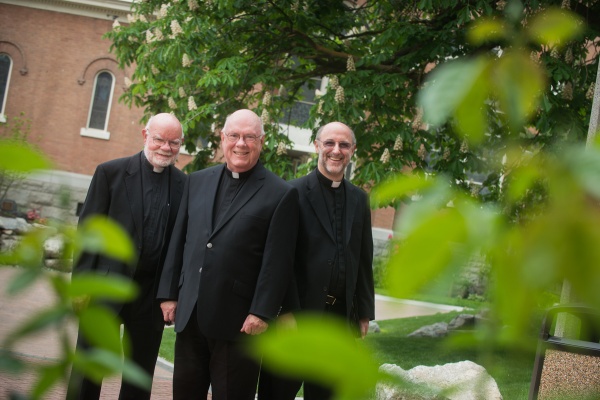By Father James Voiss, S.J. (Reprinted from the Fall 2014 issue of Gonzaga Magazine.)
Since returning to Gonzaga and taking up a newly created post as assistant VP for Mission in January 2013, that question has popped up before me in varied forms. Sometimes the language is about the “Jesuit tradition.” At other times, it is couched in terms of the distinctive “Gonzaga experience.” Or again, as an anxiety that Gonzaga might be drifting away from its core values and initial inspiration.
The questions are real. They are important. In my experience, they come out of a real love for what Gonzaga has been and a desire that something essential not be lost. Often, those posing the question have in mind a particular part of Gonzaga’s heritage that has been important in their lives, but that appears to them to be slipping from prominence in the broader range of University priorities. For example, changing the number of religious studies, philosophy or other courses required for a degree can make faculty, parents and alums anxious about GU’s commitment to what they believe distinguishes a Jesuit education.
But increasingly, the motivation for the question comes from a growing awareness that the number of Jesuits active on campus is in decline and that those who remain active are growing ever older. Can Gonzaga’s education remain “Jesuit” if the number of Jesuits on campus drops below a certain threshold, or if Jesuits do not occupy certain key positions in the administration? Have we already crossed that dividing line?
My own sense is that concerns about changes in core requirements and in the number of Jesuits on campus can be the expression of very positive values. But I am not sure that either approach really takes us to the heart of what makes an education “Jesuit.”
The Society of Jesus (Jesuits) was established as a missionary order. Only after much careful consideration did Ignatius of Loyola agree to commit Jesuits to the work of education. He came to recognize in schools a potential for advancing the missionary goals of the Society of Jesus. Our entry into education, therefore, has from the beginning been mission-driven. The Second Vatican Council called religious orders to return to their founding charisms (inspirations) and to renew their ways of life and their ministries accordingly.
For the Society of Jesus, this has meant, in the first order, that we reclaim our sense of mission. It has challenged us to enliven our orientation to mission and to shape our “way of proceeding” by an ever deeper engagement with the Spiritual Exercises of Ignatius. We have been called to see all of our works anew, through the lens of that discernment which can only take place under the guidance of God’s Spirit when we have come to a place of inner freedom. These characteristics – renewed sense of mission, grounded in the Spiritual Exercises, approached in discernment – these were foundational to the first Jesuit forays into education. They have stamped its history. They must also stamp its future. They are what make an education “Jesuit.”
Therefore, it seems to me, more fundamental than the number of Jesuits on campus or the specific courses being taught, what makes an education “Jesuit” is the mission that drives and shapes it. Or, more precisely, the ongoing dialogue between the global mission of the Society of Jesus, the particular mission of the local institution, the resources brought to bear to enact that mission (people, classes, student development, university ministry, etc.), and the way we go about that mission (discernment, cura personalis, formation of the whole person, etc.) make the educational result “Jesuit.”
Yet these characteristics can only guarantee the “Jesuitness” of the education we offer if they can effectively shape the life of the whole institution. In the face of the declining numbers of Jesuits, this means that the institutional mission, the Spiritual Exercises and formation for discernment must be shared and embraced by the faculty, staff and administrators at Gonzaga as broadly as possible. Promoting that mission and working with the faculty, staff and administration to integrate it ever more fully into all we do is how the Office of Mission helps to keep the education offered here at Gonzaga “Jesuit.”
Fr. James Voiss, S.J., is Gonzaga’s assistant vice president for mission and is rector of the University’s Jesuit community.
